Visitors to Greece can't help but notice the Greek coffee culture. There seem to be cafes every few metres, serving Freddo Coffee, Greek Frappe, and traditional Greek coffee. This quick guide explains it all.
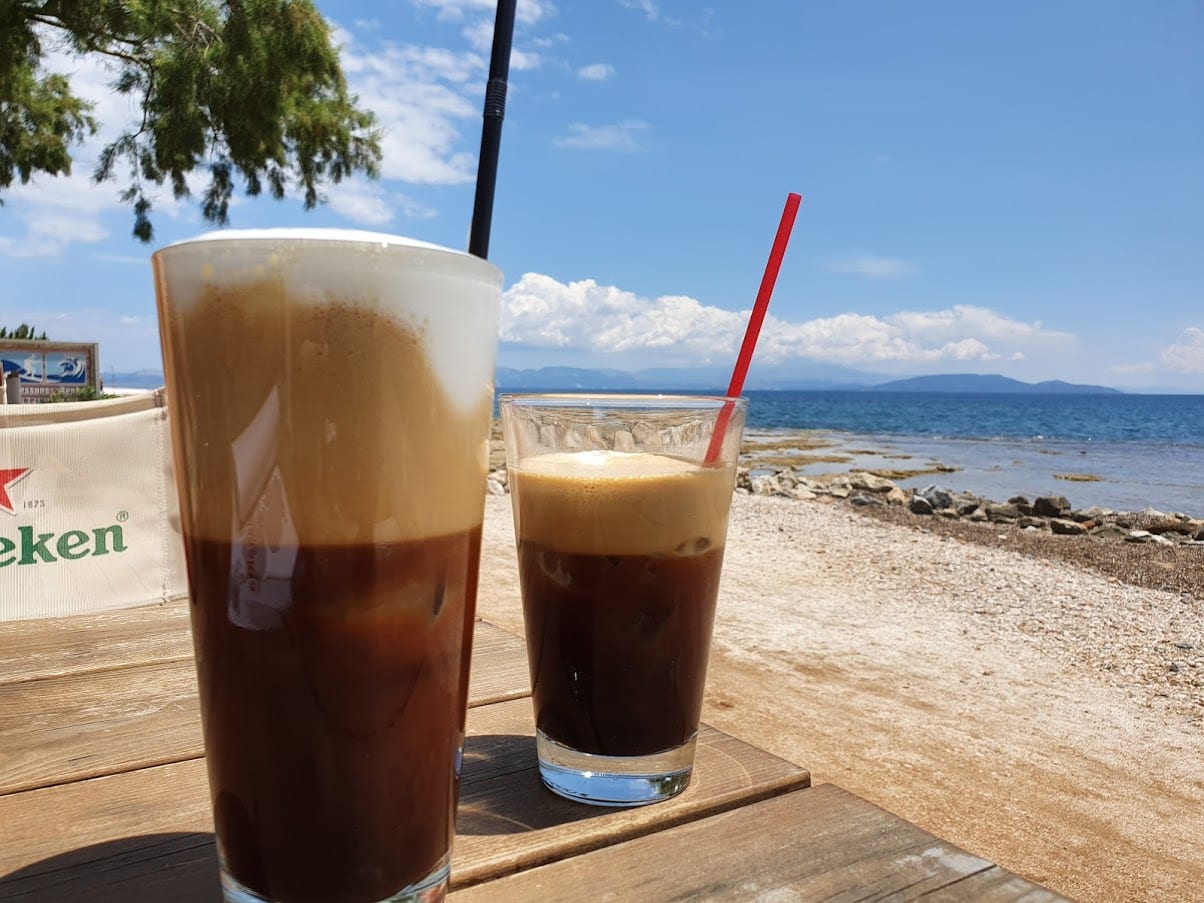
Greece Coffee Culture
Coffee plays an important part in Greek culture. You can find cafes everywhere in Greece, whether its a kafeneio serving traditional Greek coffee (ellinikós kafés) or modern Greek coffee shops offering freddo espresso.
You won't feel like a local until you're drinking a cold coffee through a straw!
What is the difference between Greek coffee and Greek frappé?
Greek coffee and Greek frappé are both popular coffee drinks in Greece, but they differ in their preparation, ingredients, and taste. Here are the main differences between the two:
Greek Coffee:
- Made from finely ground coffee beans, similar to Turkish coffee
- Prepared by boiling the coffee with water and sugar (optional) in a long-handled pot
- Served hot and can be enjoyed with or without sugar
- The coffee is strong and has a rich, concentrated flavor
Greek Frappé:
- Made from instant coffee, water, sugar, and milk
- Prepared by blending all the ingredients in a shaker or a blender, then pouring it over ice
- Served cold, with a layer of frothy milk on top
- The drink is foamy, cold, and has a sweet taste, with three levels of sweetness: glykós (sweet), métrios (medium), and skétos (plain)
My thoughts on Coffee in Greece
Coming from a country that is famous for its tea culture, it's quite interesting living in Greece. Here, a coffee culture is predominant, but it's not the fast paced caffeine induced US coffee culture. Instead, Greek coffee culture is more laid back and social.
It's one of those subtle things that contributes toward the national psyche. If you want to understand Greece, you need to understand Greek coffee culture.
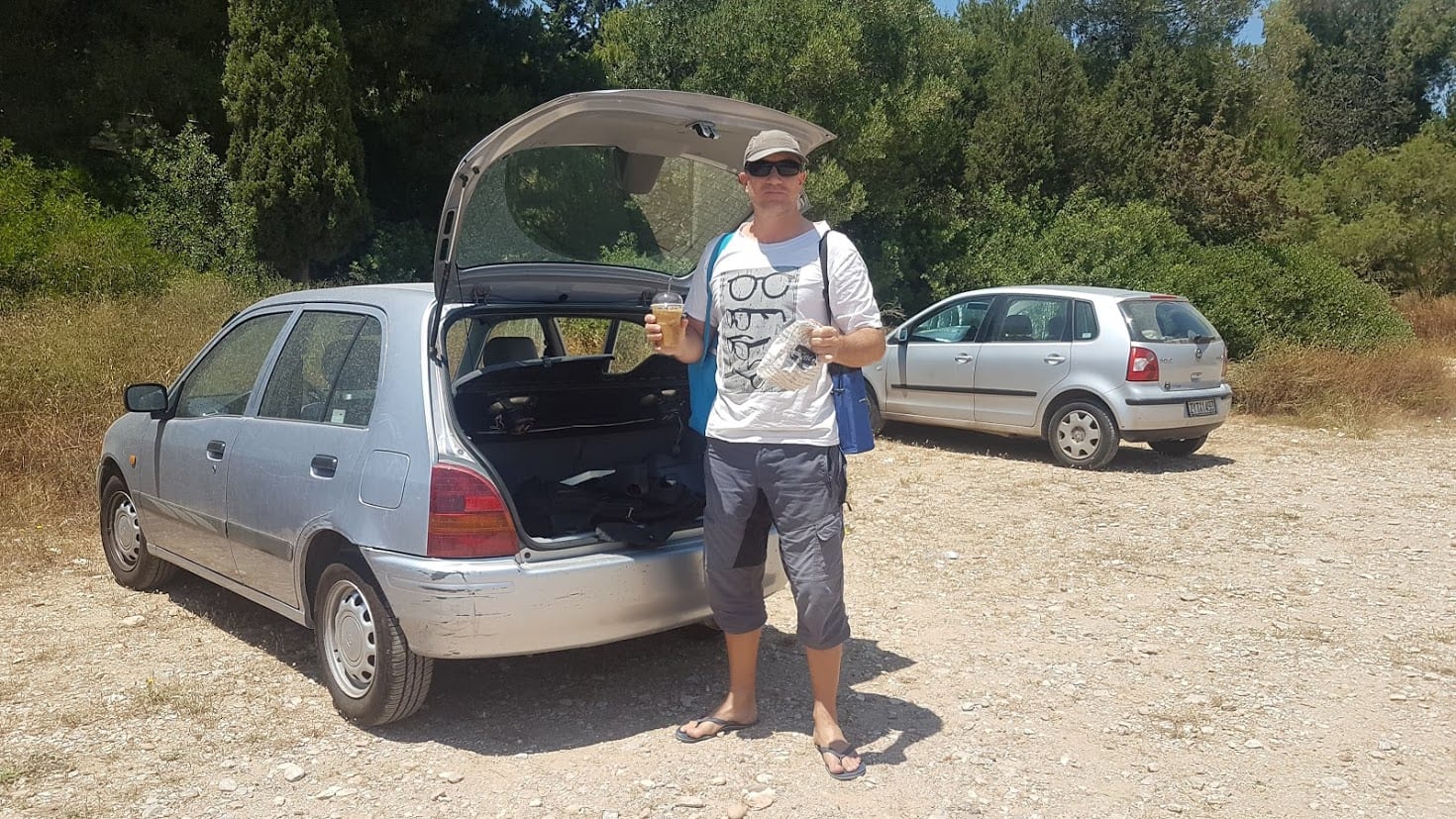
A cold coffee and a cheese pie make essential snacks to take to the beach here in Greece, as you can tell from the photo above!
Greek Coffee History
According to the most prominent theory, coffee was first discovered in Ethiopia around 850 AD, by a goat herder named Kaldi. Kaldi saw his goats jumping around after having consumed the fruits of a plant. When he tried it himself, he realized that he had more energy – coffee had been discovered.
Coffee made its way to Yemen, and later to several Arabic countries, where it became very popular as it was allowed to be consumed by the Quran, as opposed to alcohol.
It was first imported to Europe through Venice, and quickly spread throughout the continent with Pope Clement VIII’s blessings.
By the end of the 1600s, there were several coffee shops in Italy, France, and yes even England. We English swapped to a tea culture a little later!

Coffee makes its way to Greece
Coffee was often offered as a gift, and was regarded as a highly desirable substance – in more than one battle against the Ottoman Empire, European armed forces came away with plunder of large quantities of coffee.
As Greece was occupied by the Ottoman Empire for about 400 years, it is no mystery that coffee made its way here. Even though there were special places to have coffee, called kafenes / kafeneio, the enslaved Greeks were not allowed to visit.
The Greek Kafeneio
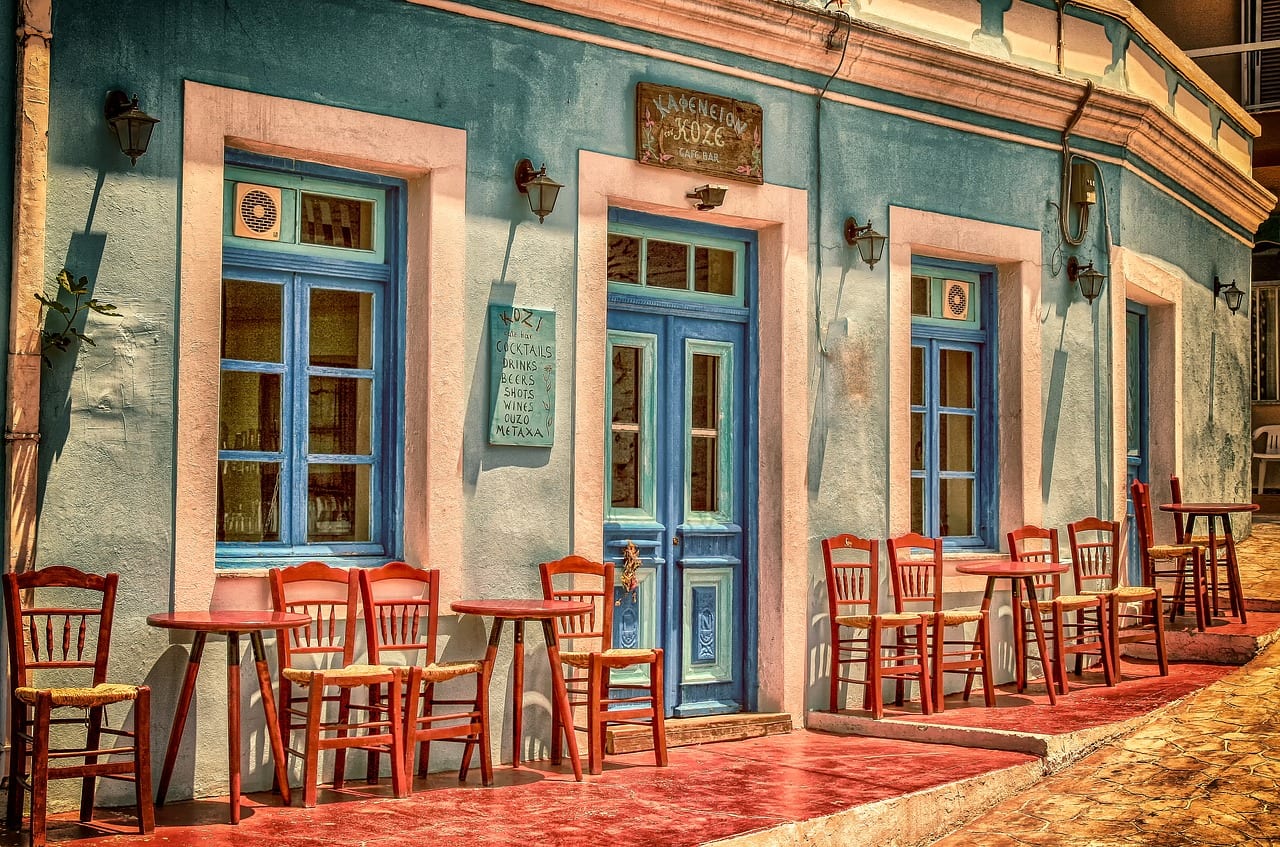
After the country won its independence in 1821, the first Greek kafeneio opened in Nafplio. When Athens became the capital, in 1834, there were already a couple of kafeneia – ironically, the first one was opened by a Bavarian.
While originally the kafeneia were men-only places, women were eventually allowed – which was a shock for the times.
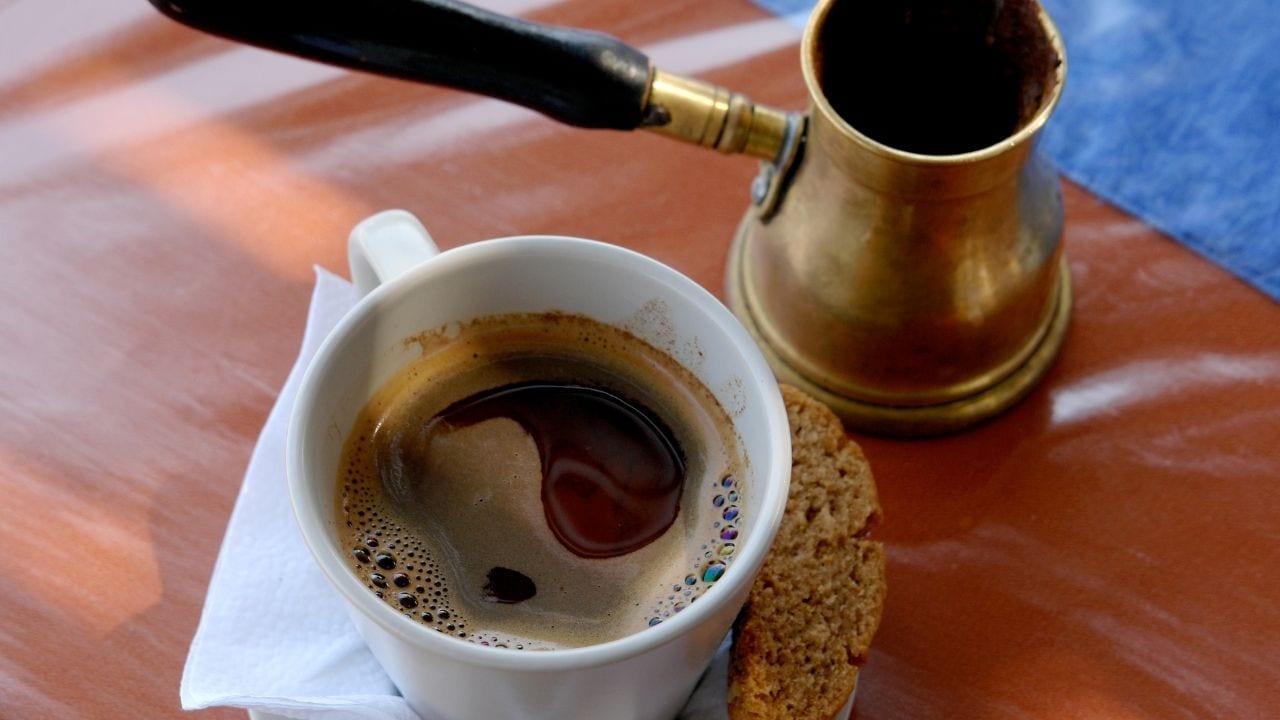
The original Greek coffee culture
The coffee served in the original kafeneia was essentially the same type of coffee that can be found today in Greece, Turkey and many Arabic countries.
The Greek coffee, which is exactly the same with “Turkish coffee” in Turkey, is boiled in a small tin pot, called briki, and then served into a small cup. If you want sugar, it will need to be added before it’s boiled.

This coffee will leave a residue at the bottom of the cup, which is not edible – so make sure you don’t drink up. These days you can also get a double Greek coffee.
Modern Greek coffee culture
But this is not what Greek coffee culture is about! Greek coffee has definitely made a comeback, especially among young people and students, as it’s fairly inexpensive compared to other types of coffee in Greece.
However, there are several other types of coffee these days, and if you are a coffee lover you should try a few of them.
The famous Greek frappe
According to Wikipedia and other sources, the most famous Greek coffee, called frappe, was invented in the late 1950s in Thessaloniki. This type of coffee is super popular all around Greece, and it is also linked to a relaxed, carefree attitude.
In order to make a frappe you need instant coffee and water, and optionally sugar and milk, often the condensed variety. The coffee and sugar are blended together using a special frappe machine, and milk can be added on top. The frappe is then poured in a glass full of ice cubes and served with a straw.
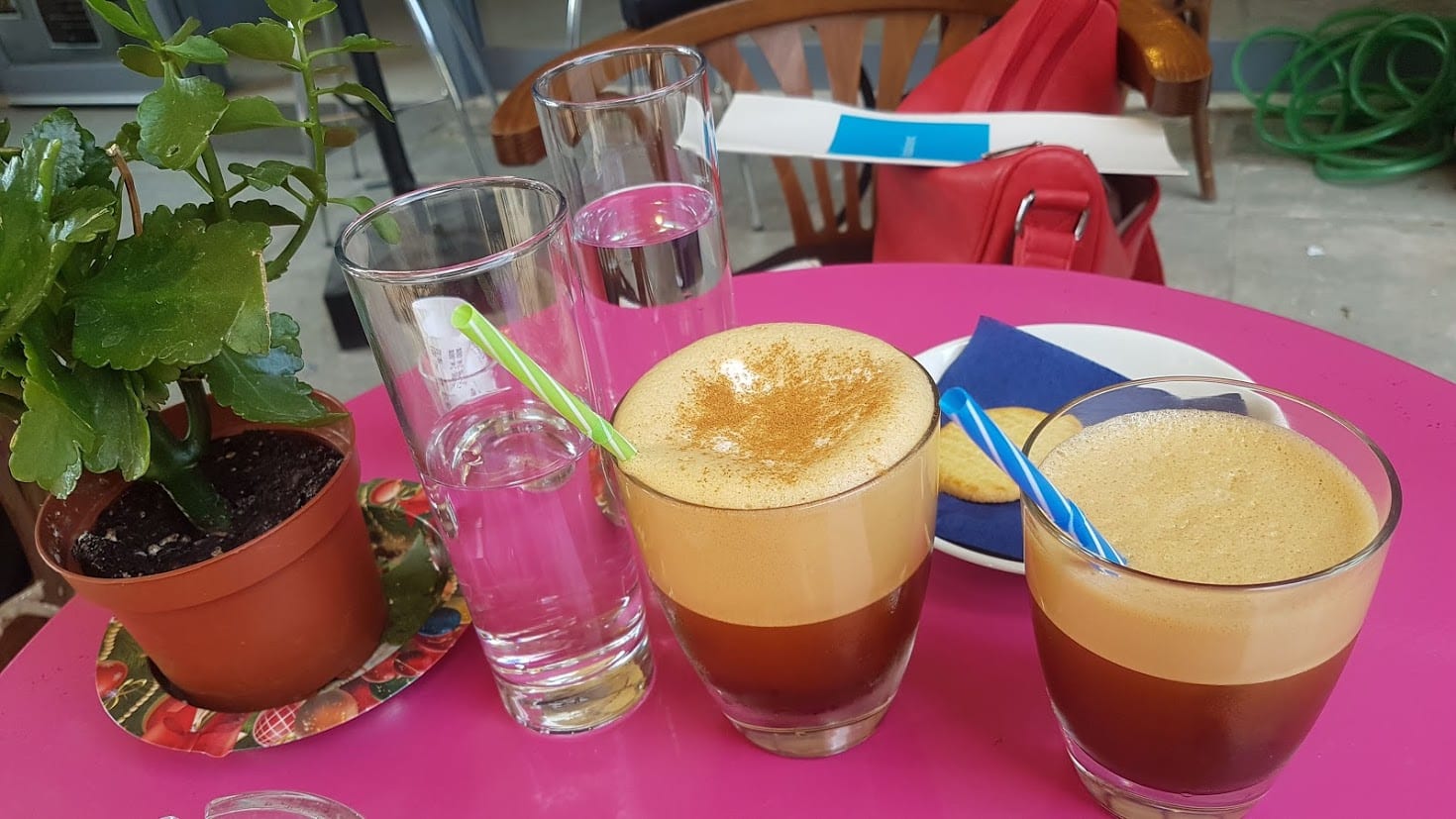
The expression “let’s go for a coffee” essentially means “let’s go for a chat”, and the frappe can be made to last for a couple of hours, often adding more cold water in the drink. Frappe can also be served with ice cream, Baileys, or other suitable liqueurs.
Freddo Coffee in Greece
While many Italians will definitely frown upon the idea of a cold version of their national coffee, Greeks seem to love it. A shot or two of espresso over ice, with or without foamy milk on top, is close to becoming (or has already become), the new staple.
In fact, many cafes around the country have invested in espresso machines in order to be able to make these types of coffee, that were unheard of 20-30 years ago. In short, Freddo Coffee is becoming the new Greek coffee!
Cold brew coffee in Greece
A more recent coffee trend in Greece, is cold brew coffee. Unlike the freddo espresso coffee, where hot coffee is poured over ice cubes, cold brew coffee is another thing altogether.
Here, the coffee grains are immersed in cold water for a period of 12-24 hours, which helps in preserving the aromas and reducing the bitterness.
If you are a coffee connoisseur (or just curious), you will find several cafes that offer cold brew coffee in the bigger cities.
Hot coffee in Greece
By now you must be wondering if hot coffee is still a thing in Greece – yes it is. Apart from the Greek coffee, other common types of hot coffee are instant coffee, espresso and cappuccino, while filter coffee is far less popular among Greeks. Arguably, these are most likely consumed in winter rather than summer.
Coffee Shops in Greece
There's no better place to experience the Greek coffee scene than in a coffee shop! They are not hard to find – they are literally everywhere, no matter where in the country you are.
With only a few exceptions (Starbucks mentioned later), you should just find yourself a table and sit down. Someone will come out to you and you order your coffee with them.
The coffee drinking experience is not expected to be rushed. Many Greeks seem to sit for hours with a half finished coffee they bought earlier either chatting or watching the world go by.
Takeaway coffee in Greece
Go for a walk around any big city, and you will definitely come across locals rushing around, carrying plastic cups with a straw.
Almost any half-decent place that offers food, including many bakeries, can make a takeaway frappe.
At the same time, there are several franchises that make hundreds of cups of takeaway coffee on a daily basis, such as Coffee Island (likely the biggest franchise in Greece dedicated to coffee), Everest and Grigoris, to name a few. You can even order it online!
Starbucks Athens Greece
The reason I am mentioning Starbucks, is that they seem to be one of the very few places that have fully complied with the anti-smoking law.
While I find their drinks are overpriced and pretty bland, and the environment quite impersonal, I sometimes go there to work, like some other people.
However, if you are visiting Greece for leisure, there are plenty of other choices out there, so I don’t really recommend going to Starbucks in Greece.
How much does Greek coffee cost?
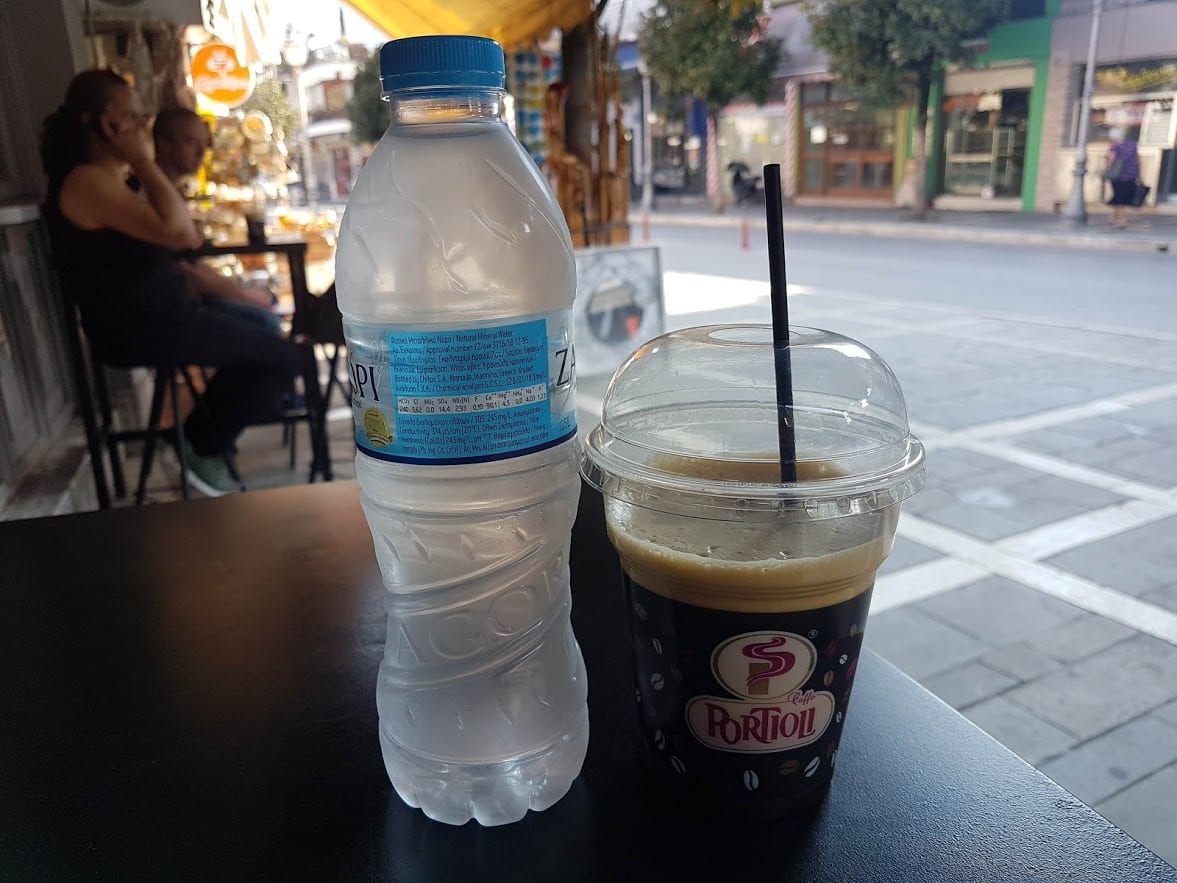
The answer to this varies a lot, as it depends on the type of coffee you are having, the type of establishment, the area, the view, and whether it’s a takeaway or you want to sit somewhere.
While a takeaway frappe can start from as low as 1 – 1.50 euro (sometimes even including a small bottle of water), a more elaborate drink can set you back a lot more – especially if you go for a cold brew coffee with a shot of liqueur and a rooftop view of the Acropolis. The choice is yours!
More Greece Travel Tips
Planning a trip to Greece? Here's a little more information to help you out.
- Money in Greece
- Greece Travel Guides
- Ultimate Guide to Athens
- Things to know before traveling to Greece
- Fun facts about Greece
- Basic Greek words for your vacation in Greece
FAQ About the Coffee Culture in Greece
Still have some questions about what to expect when it comes to drinking coffee when on vacation in Greece? Here's a few commonly asked questions:
What is traditional Greek coffee?
What we know as traditional Greek coffee is typically boiled in a small tin pot, called briki, and then served into a small cup. Sugar should be added as it is boiled, and you can ask for it as sketos (no sugar), metrios (one sugar), glykos (sweet, two sugars), and variglykos (very sweet – lots and lots of sugar!).
Is coffee popular in Greece?
Coffee is a significant part of contemporary Greek culture. You can find coffee places in every town and village, and in Athens it is hard to go more than 100 metres without finding at least one coffee shop! Drinking coffee at a slow pace with company is part of the coffee culture in Greece.
What is the best Greek coffee?
Loumidis was the first ready made and pre-packaged coffee that could be made in an ibrik coffee pot. Today, it is still the most widely known Greek Coffee, and its packaging has a colourful parrot on the front.
Is Greek coffee strong?
Traditional Greek coffee is quite strong, and is normally served with a separate glass or bottle of water.
Why do Greeks drink so much coffee?
Drinking coffee has been part of the culture for at least the last hundred years, but regained its popularity during the crisis years in Greece as being able to go out to drink coffee with friends was still a relatively affordable thing to do.
Is Greece known for coffee?
After Greek Independence in the 1830's the first Greek cafes serving traditional ibrik coffee opened, and over the years developed into a thriving modern coffee scene. While many people know of the traditional Greek coffee, most younger Greeks tend to drink more of the cold coffees such as freddo espresso.

 – Dave Briggs
– Dave BriggsDave is a travel writer based in Greece As well as creating this guide to the coffee culture in Greece, he's also written hundreds more travel guides to Greek destinations. Follow Dave on social media for travel inspiration from Greece and beyond:
Hello Dave,
Am a Coffee lover, my morning does not start until I’ve inhaled it’s heady aroma while it brews.Sipping from a steaming cup is pure bliss. Glad there is espresso & cuppacino too. I don’t think a freddo would suffice for me in the am.But will definitely try it on my upcoming trip.
This article is a wonderful glimpse into a country & culture.
Thanks ever so much.
Hi Dave
I’m enjoying your pages on Greek culture and coffee.
I love coffee but only drink decaf because caffeine raises my blood pressure too much. Can l get decaf coffee in Greece?
Lots of decaf coffees here in Greece – Vanessa (my better half) often has a decaf in coffee ships 🙂
Coffee in Greece is more than just a beverage. It’s associated with a beloved pastime! It isn’t uncommon to see people gathering in the cafes and restaurants, just to enjoy some of these coffee drink with their friends and loved ones.